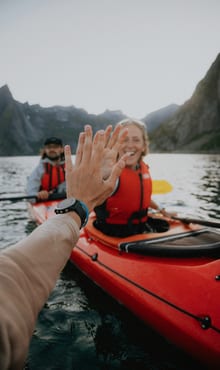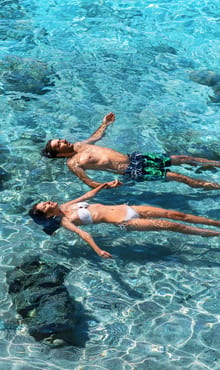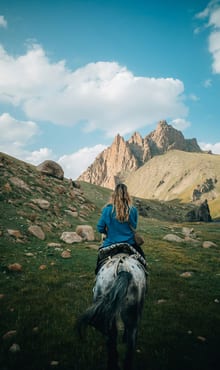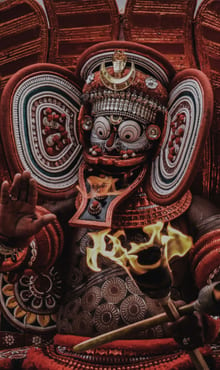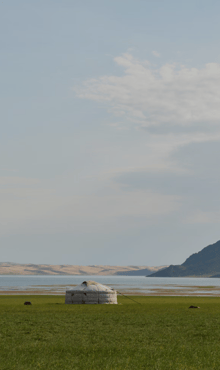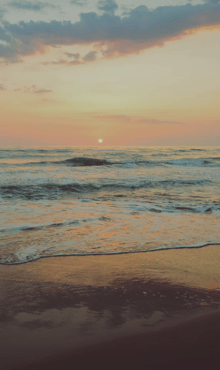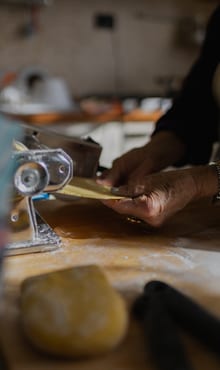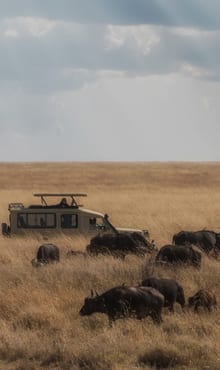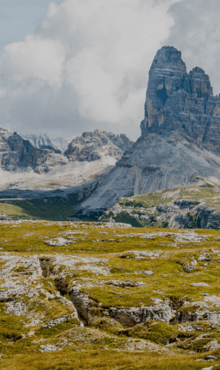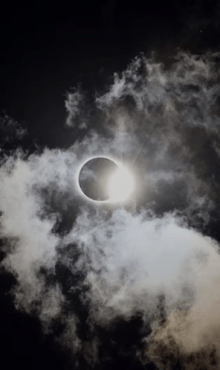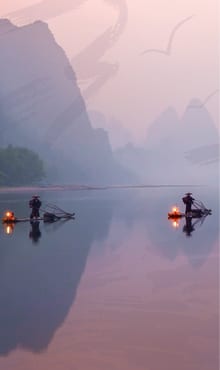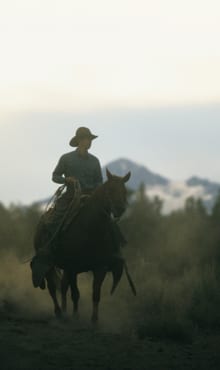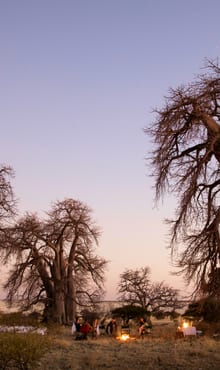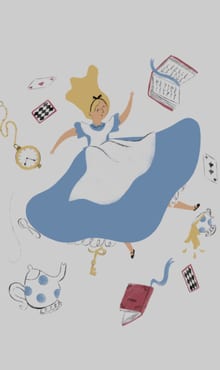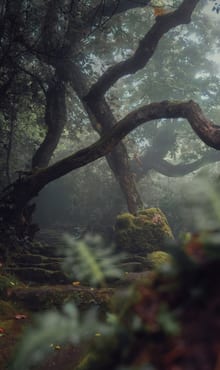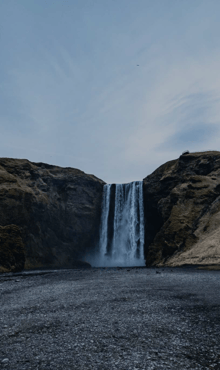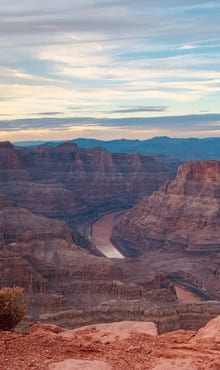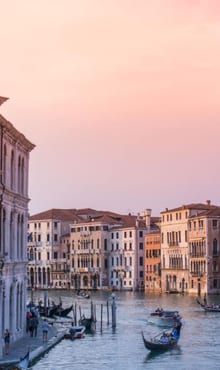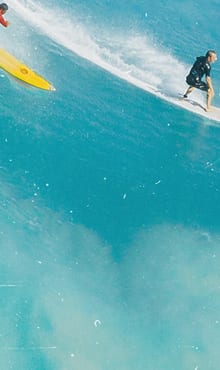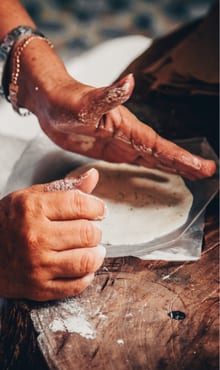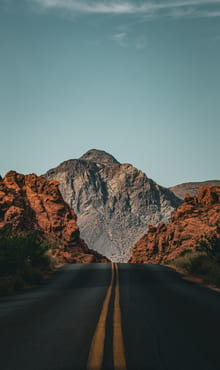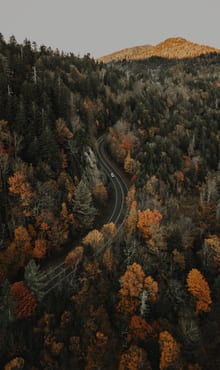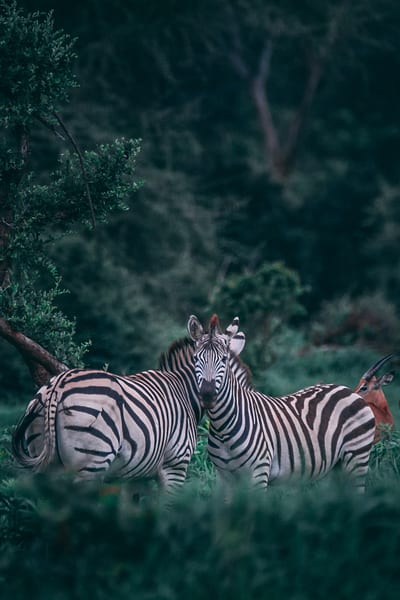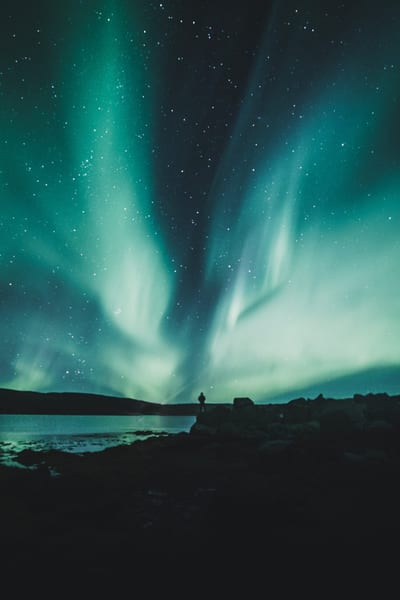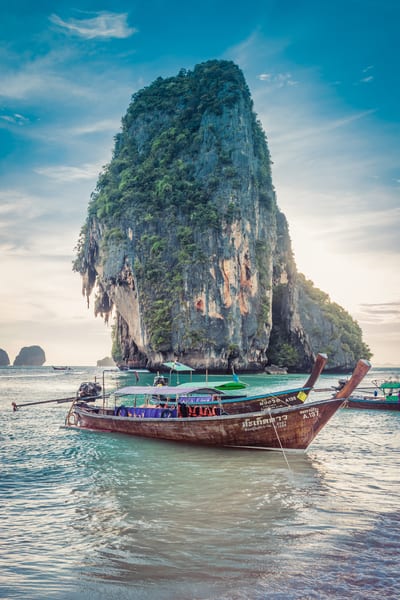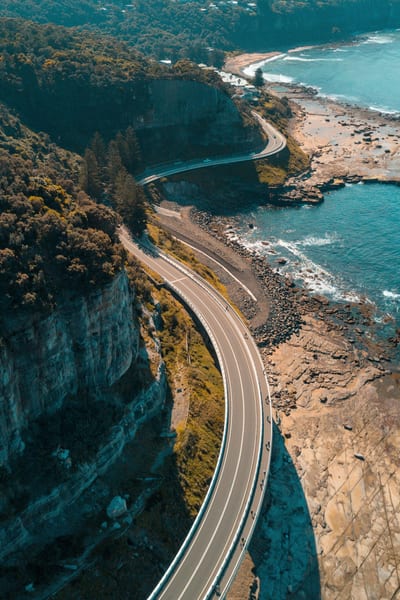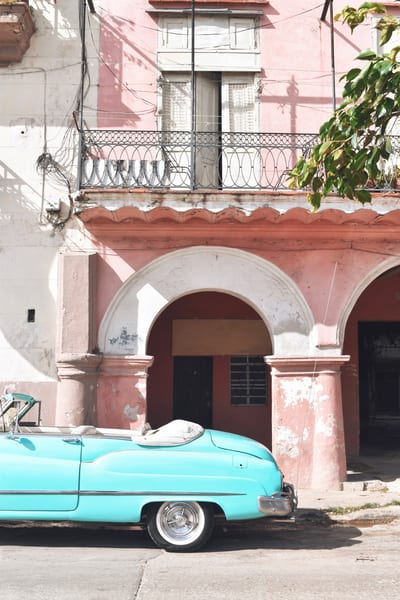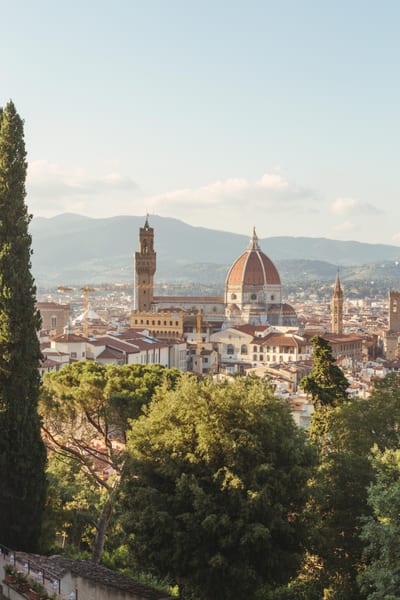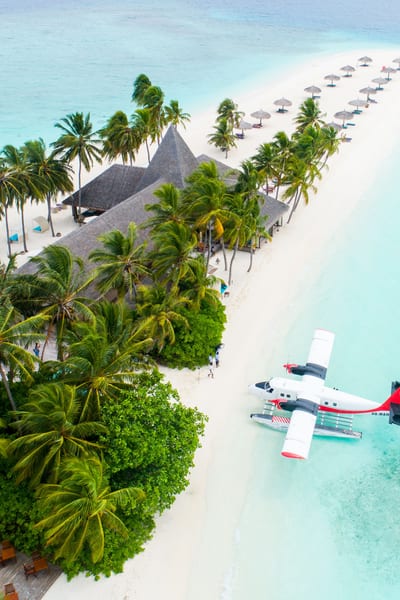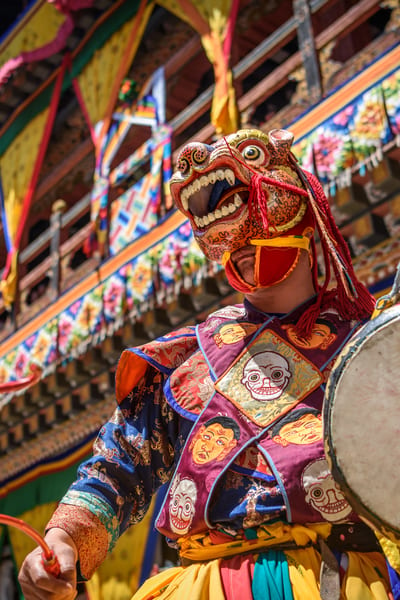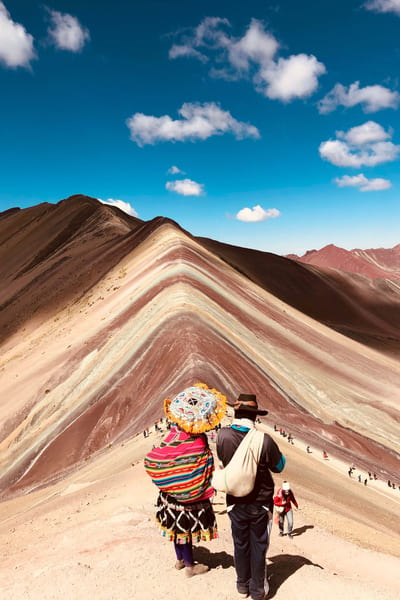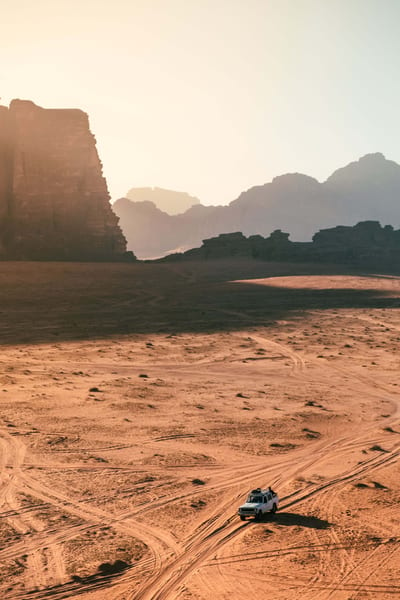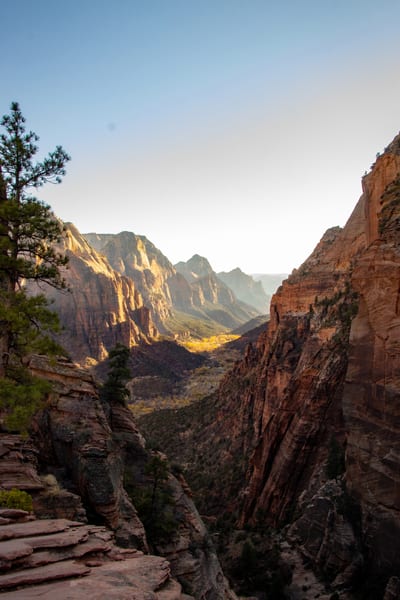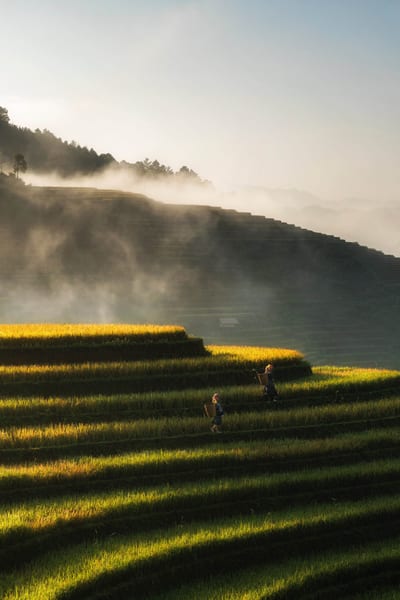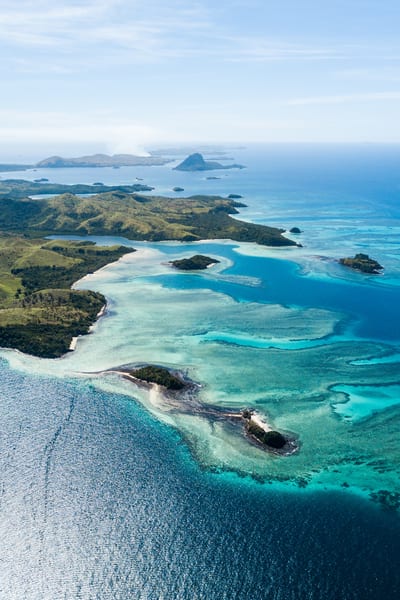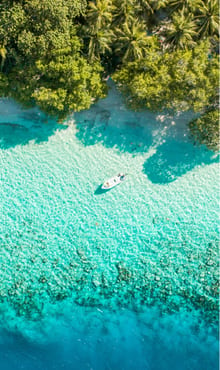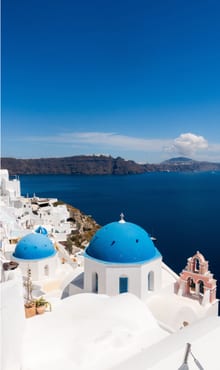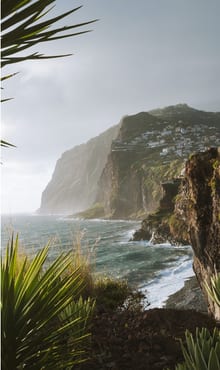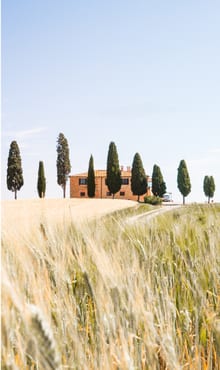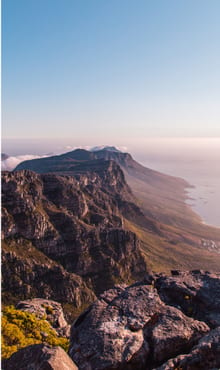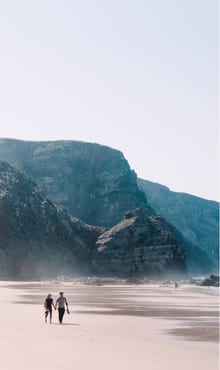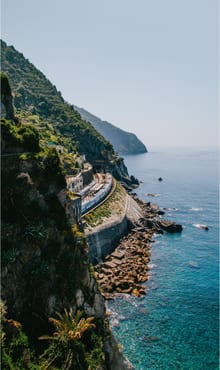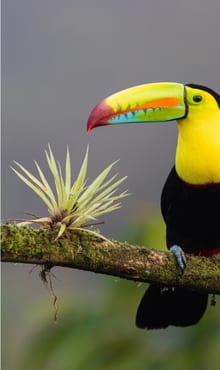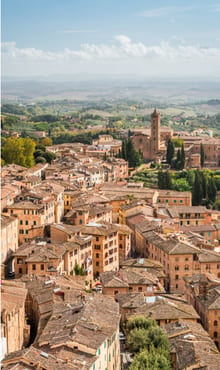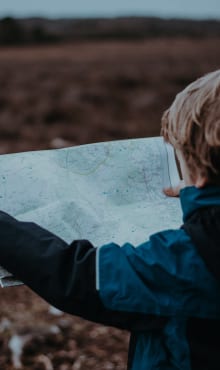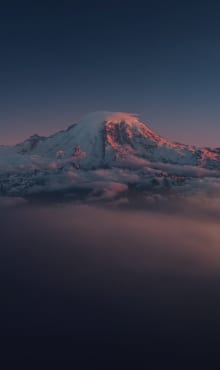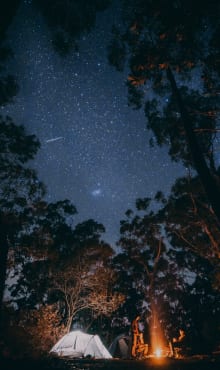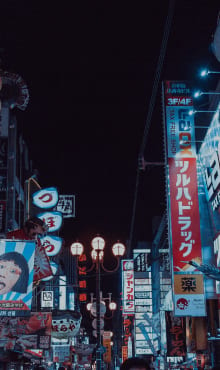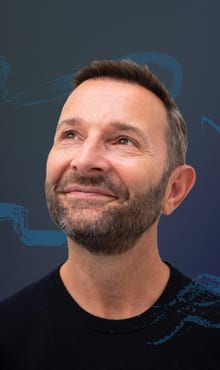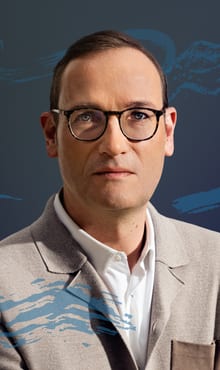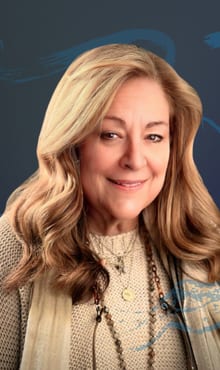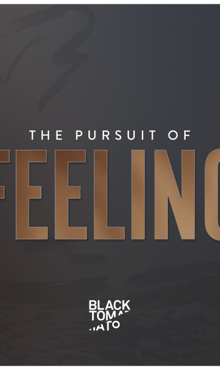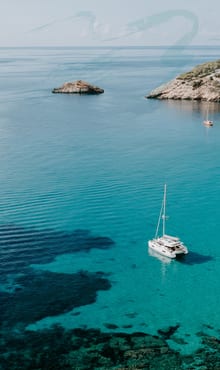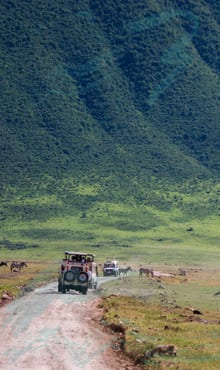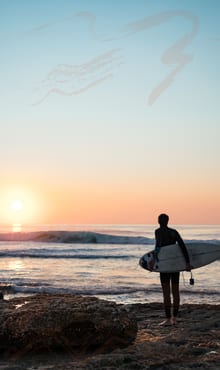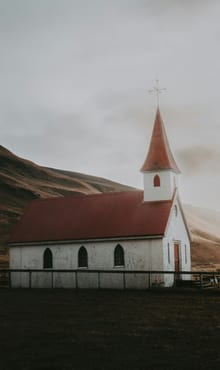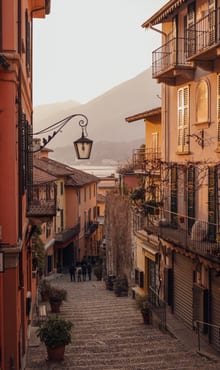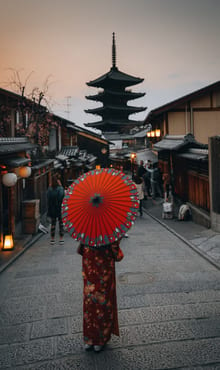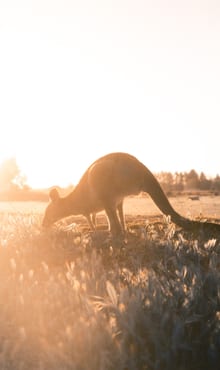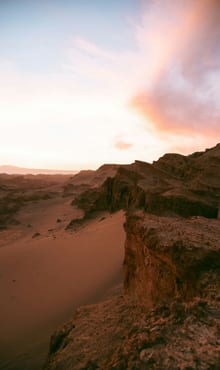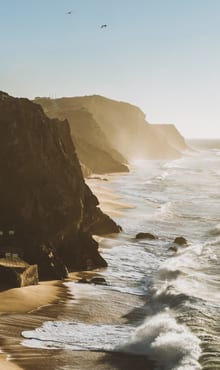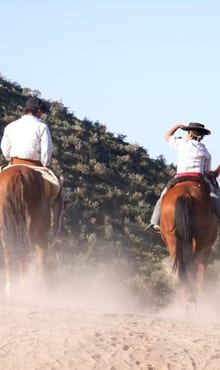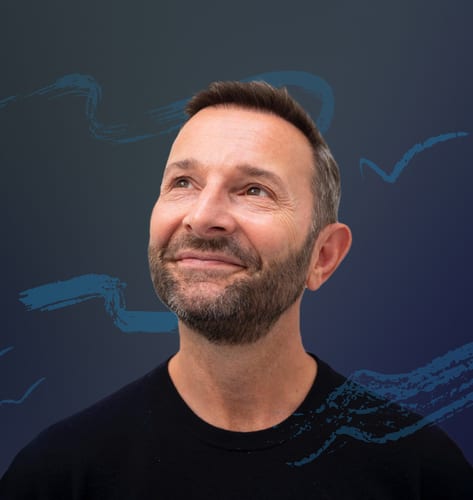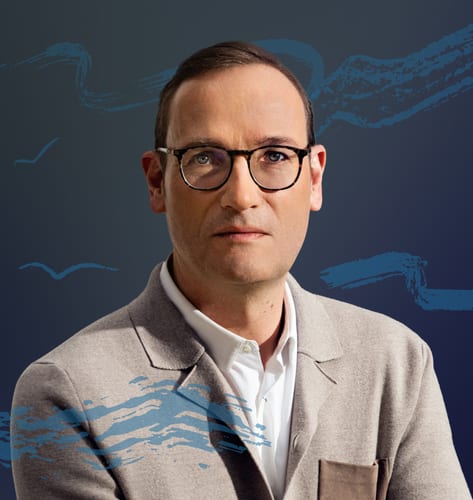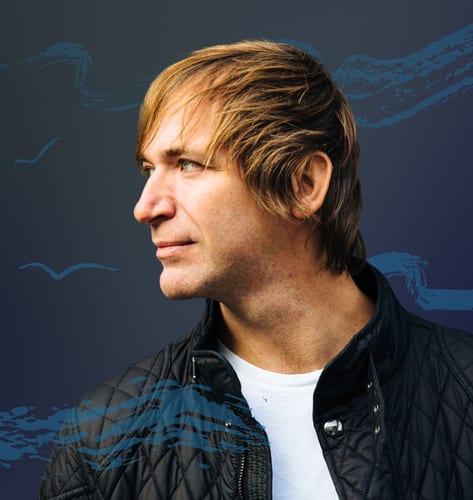Transcript
Owen Vince: 0:01
You’re listening to the Pursuit of Feeling, a podcast by Black Tomato. In this new series, we want to explore not only the world of travel, but the world of emotion and what it ultimately means to feel our way through the world. In each episode, you’ll also get a Rolodex of recommendations from our guests on where to go, what to do and where to stay all around the world.
Tom Marchant: 0:26
Our guest today is someone we’ve long admired, Ash Bhardwaj, an authority on travel in all its emotional, cultural and philosophical depth.
Tom Marchant: 0:33
Ash is a journalist, filmmaker and the award-winning author of why we Travel, an inspiring travel book that celebrates the transformative power of journeys and which has been recognized with prestigious awards, including the Lowell Thomas Award for Best Travel Book.
Tom Marchant: 0:47
Ash’s work regularly features across major platforms, from the BBC to the Telegraph, the Times and Wanderlust, where he brings a rare blend of storytelling, insight and humanity to the way we understand the world. What sets Ash apart is his ability to look beyond the surface. He’s not interested in travel as a checklist of destinations, but as a lens through which to explore grief, identity, connection and what it means to be truly curious. In this conversation, we talk about his own journey, the pivotal moments that shaped him, and dive deep into the psychology of travel, the stories behind his book and the emotional power of moving through the world with intention. This episode is a journey in itself across borders, memories and ideas, and a reminder that the pursuit of feeling isn’t always about chasing something new, but about noticing what’s already there within us and around us, if we’re willing to look closely enough.
Tom Marchant: 1:35
Today I’m delighted to be joined by Ash Bhardwaj on the Pursuit of Feeling podcast. Ash is a British travel journalist, broadcaster, podcaster, lecturer and author. Journalist, broadcaster, podcaster, lecturer and author Huge amount of awards and has a take on travel that I, having read a lot of his stuff, I think is really unrivaled and also very pertinent to the theory and sentiment behind the Pursuit of Freedom podcast. Last year he published a book called why we Travel, which won the Independence Book of the Year and has had huge amounts of acclaim, and in it Ash speaks to many of the motivations for why we travel and I really urge anyone who has the opportunity to buy the book and read it and enjoy Ash’s unique and deeply emotional take on the world of travel. Ash, thank you so much for joining us today.
Ash Bhardwaj: 2:13
Tom lovely to speak to you. Thanks for having me on.
Tom Marchant: 2:15
Pleasure pleasure. So probably lots we could talk about. But to start off, you’ve built a career exploring the world through lenses of curiosity, storytelling, human connection, and you’ve come a long way with that. As we’re speaking today, how would you describe your relationship with travel and how it’s evolved the different chapters of your life from when you were a soldier to a teacher, to a journalist and now an author?
Ash Bhardwaj: 2:36
I think the first thing that has changed is I’m more conscious about my travel. So I don’t just think of travel as the objective. It’s not the end in and of itself. I think of it more as a mechanism or a tool through which you can do other things. So that’s the first thing. It’s like I’m not just a traveler and if I travel, that’s sufficient. I also recognize that some of my early preconceptions about travel are flawed. Some of my early preconceptions about travel are flawed. Satisfying travel isn’t about going really far, or is it about doing exceptional or challenging things. It’s about aligning the way I travel and what I’m doing, what I need at that particular time. So I think, particularly when I was doing some of the expeditions and so on, or when I was taking a year out between school and university, I had sort of high polluting, quite snobbish ideas about what good travel was, and I certainly don’t have that anymore.
Tom Marchant: 3:31
To go back, to the younger Ash. What were those high polluting ideas and how and why did they evolve?
Ash Bhardwaj: 3:37
I mean, I left school in 2001. I took a year out and then I went to university in 2002. So this was probably, as gap years were starting to become a bit more democratized it wasn’t just the people from wealthy backgrounds that sort of evolution of what had been the grand tour of the aristocrats, that was the original gap year. It was starting to become more widely known the beach, the book the beach, and then the film the Beach had come out, and so people were aware of this idea of just spending 12 months living cheaply.
Ash Bhardwaj: 4:07
At that time I was like well, I’m not just going to go to Thailand or Cambodia, or I’m not just going to go down the east coast of Australia, I’m going to backpack around India and learn about my heritage, learn about my father’s religious background, that kind of slightly more challenging travel.
Ash Bhardwaj: 4:23
And to me that was sort of high-level travel. I kind of realized when I was on it that actually backpacking is just being on a very cheap package vacation, because all you’re doing is you’re going from one Lonely Planet hostel to another Lonely Planet hostel with a bunch of other people from Europe and the United States and you’re all doing the same thing. So really it’s a bit like a package vacation, but very cheap and over a longer period of time. But it took me quite a few years to kind of think about it in those ways and realizing well, actually there’s nothing wrong. People just want to go and spend their vacation time in a resort in spain. I personally don’t find it very satisfying. But I don’t think there’s a kind of hierarchy between those different things yeah, I think it’s I.
Tom Marchant: 5:01
That’s something that definitely resonates with me. I think when myself and my partner, james merritt were at university and everyone was either taking gap years before they come or when we’re at university, taking long trips over the summer, there tended to be a kind of a rush towards what you call the classics. They touched on some of them from the east coast, australia, thailand, and we I remember our first year at university just didn’t want to do that. So. So we kind of looked in the area and just opted for the Philippines and at the time this was say 20 plus years ago, maybe more than 25 years ago that was seen as a place really with a bit of mystery or just not known. I think back in those days it was known for maybe it’s more like in Elder Marcus’s shoe collection. That was kind of when it dominated the headlines.
Tom Marchant: 5:41
What it did was when we went there and took these crazy journeys through the South China Sea. It really spoke to our curiosity and gave us something that we didn’t feel others were doing. Not because others we didn’t do it, just because others weren’t doing it. It was more to the travel than we thought, just being in the same place with others. And don’t get me wrong, I have done that part of Australia on that trip subsequently and whilst there were great memories from it, you still couldn’t get away from the fact that there were a lot of people on a bus going to the same place as everyone else. And actually, if part of travel is exploring other cultures or having your moment challenged by other places, that doesn’t necessarily speak to it, as good as it is.
Ash Bhardwaj: 6:16
So I don’t think travel has to be those things. I don’t think it has to be exploration of other culture, because travel’t a definition. Travel is a mechanism. Travel is leaving one place to go somewhere else. I think those are really good things to do when you’re traveling and I think it’s important, therefore, to understand what you’re trying to get away from from home through the mode of travel and what you want to engage with once you get that. So the push and the pull within while we travel.
Ash Bhardwaj: 6:42
I explore this thing that people used to discuss a lot in backpacker hostels Are you a tourist, are you a traveler? And I looked at quite a bit of academic research when I was writing the book. Some was psychology, some was sort of identity theory. My first degree was in philosophy, so you can understand where all this stuff came from. What I conceptualize through the work of some other academics is the idea that an explorer is the first person from a community or culture to visit a particular place and brings awareness that that even exists back. That’s what an explorer is, or brings back brand new information.
Ash Bhardwaj: 7:14
A traveler is going somewhere where they’ve heard stories about, where the boundaries are known, the structure is known, but you are experiencing things that people have probably not paid to do and replicate before. You tend to be experiencing things that people already do in that place as part of their daily life. You know the first person that got on a gondola in Venice as a traveler. He wasn’t doing it because I’m going to go to Venice and go on a gondola. He was like, oh right, people are using this as a tactic. Great, I’ll jump in and do it. And then the tourist is someone who’s heard about something that already exists, knows that it exists and pays to do something. So most of us, when we’re traveling, we’re tourists. But there’s this funny thing with identity that happens where people don’t like to think of themselves. It’s replicating what other people have done.
Tom Marchant: 7:59
Yeah, and I think for a lot of people, that word tourist some people see it as a pejorative word, right, because it sort of says I’m part of a crowd, I’m following others and not everyone. But people in the area might like to think that they’re not. I think for us it was more a curiosity about what we might find and how that might make us feel. So it wasn’t that we had mapped out. These are the reasons why we need to be in the philippines, because of all these things. It was about this. There’s stuff we’ve heard that’s interesting, but I want to go and kind of see how that, as an experience, what that presents to me. You know good and bad. That’s a type of yeah, you have the academia on this. I think that feels like a certain type of traveler who is open-minded to the various feelings that are generated within them by taking certain trips.
Ash Bhardwaj: 8:47
So you’ve hit on two very key things here, which is within the book. What I explore is that whenever we discuss travel, which includes tourism, we tend to focus on what I call the mechanisms. If you speak to people, they will talk about mechanisms and the outcomes. The outcomes is what did you get from this? I had fun, I enjoyed myself, I relaxed, so that’s quite feeling oriented right. And then the other thing they talk about is the mechanism. So where I went, what I did, what I saw, how I did it, what level of engagement you had with the local community, what level of dependency you had on an operator. That’s the mechanism, that’s how it’s done. What I was interested in was the motivation, which is the push and the pull. So that is, it is a, it is a, a feeling, and a feeling is actually just the conscious interpretation of an emotion. Funny, you say, because I’ve actually got my feelings wheel that I I go through with my daughter I well know that wheel yeah so you know, you’ve got.
Ash Bhardwaj: 9:44
You’ve got emotions on here, but an emotion is a very physiological thing and we’re often not conscious of it. When someone is being sure or frustrated, frustrating or argumentative, those are external behaviors, but underneath it there’s an emotion, but it’s not until they become conscious of it that it becomes a feeling. So being sad might be an expression of an emotion that is quite different to sadness. So that’s there you go. There’s my psychology and research. But what motivation does is it’s trying to put a conscious thought onto an emotion. So it’s applying feeling onto an emotion and it’s understanding what you want, what’s pushing you away from home, what’s pulling you to a destination. And curiosity, I, I think, is the root motivation. So I explored 12 different motivations curiosity, inspiration, happiness, serendipity, hardship and I won’t list them all, but once you know what is either pushing you away from home or pulling you towards a destination, then you can structure a trip around, and it sounds like your ph. Your Philippines trip is exactly that. So you knew that you were a curious person. You wanted to discover things that no one else that you knew could give you the answers to. You knew that you’d heard stories of other people going traveling. This is the inspiration thing that had discovered exciting things and it could be transformative. Didn’t want to over plan, you didn’t want to fill your itinerary with things you already knew you were going to do. So you’re creating the opportunity for serendipity for yourself. So that trip to the Philippines is a really good example where a trip is actually a bunch of different motivations altogether.
Ash Bhardwaj: 11:17
And then the mechanism that you chose was backpacking within a place in which you didn’t know the opportunity, you didn’t know the facilities that you were going to find when you were there. And then there’s a discovery. I mean, when levin I backpacked, he walked along the length of the river nile. It was a big backpacker trip. That’s a big one. He’s basically backpacking we he walked the entire length of the river. Now, this is my friend libson, and I did um about a sixth of it with him. You we just had to get to the end of the river. But in between, who knew what was going to happen?
Ash Bhardwaj: 11:48
And because we didn’t have anything that we had to do every day, we had these opportunities for serendipity and that was remarkable because you didn’t know what feeling it was going to give you right, you weren’t sure what the outcome was going to be. It could have been sadness. I mean, we saw some terrible things, you know, such as the fact that there were loads of Arsenal fans in northern Uganda. That’s a very sad thing to know. How are you, kev? It’s constant disappointment for those poor men in Uganda. I had a lot of empathy for them. But then also we saw things like a Sufi festival in the middle of the desert. That was actually awesome, in the sort of technical sense of the word, that we felt all the 10,000-odd teethies had come to the middle of the desert for this festival. So we’ve got these feelings as a product of these motivations throughout. That’s a really good point.
Tom Marchant: 12:34
It’s something we talk about a lot because we get a lot of people. One of the insights we started the company around was people didn’t necessarily know where they wanted to go, but they wanted to know how they wanted to feel. And the thing with feelings is you get a. You can have a full gamut of feelings in a day, right. But there were certain things where someone said, yeah, this year, when I take a trip like I want to feel challenged or I want to, at the end of it, feel like I’ve had a sense of achievement and I’ve or I’ve earned it. So what we would look at is places that, by nature, the kind of activities or the that destination would speak to these types of things, but also within that know that there’s a full range people could be having. And what we found interesting is a couple of things that you talked about there and serendipity.
Tom Marchant: 13:13
So we plan, we curate, we know the world very well, but we also, you know, a lot of our clients are depending on your definition of explorers or travelers want to talk to us for our insight and expertise, but then also look for that sense of their own discovery or your own places.
Tom Marchant: 13:26
You know it’s it’s it’s horse for courses. Some people want to have everything fancy every degree, every hour of the day, and that’s fine. What we find with others is we have this thing called um frame spontaneity, so where we can take people to places where we know, just by them heading out and exploring, they will, you know, chance upon, or whether it be in cities or certain parts of the world, or treks in across Iceland or in the southern Sahara Desert, there are just things that will happen that almost add the emotional heft of I’m discovering something and it’s making me feel in this particular way, and there’s a degree of ownership of that, if you like. That’s something that we keep coming back to and I think, like you were saying, you’re just casual walk to the local news agency along the length of the Nile. People have limited time, so sometimes when people are going, well, I’m going to take two weeks off and I’m looking for something. How do I do that? So that’s where it’s fanning, but encouraging their attitude back to an early journey.
Ash Bhardwaj: 14:30
You remember, like the first travel moment when it really hit you, like emotionally, like this is, or how it made you feel, that made you almost embrace this incredible life you have now in terms of which you get to seek out and explore and challenge travel the only long distance travel I ever did as a kid was going to visit family in India at the age of eight, and I just remember being really aware that there were people in the world whose level of poverty and suffering and opportunity was so different to what I had that that was a very emotive moment. I don’t think I was then able you know know, I was eight I just found it quite upsetting. I mean, that was definitely a feeling. Then, when I went to New Zealand when I was 18, so I went to a state school and usually we played rugby and usually we had a subsidised rugby tour and we went to Australia, New Zealand and the Cook Islands my mum said I’ll get you on this tour, I’ll pay for you.
Ash Bhardwaj: 15:13
She worked as a cleaner but she got. She paid for my subsidized ticket, um, because she said I think this will be really meaningful for you. She’d been to new zealand to visit family with five pound palms and jews kid. We won our games in australia and then we got to new zealand and the thing that I remember as soon as we came off the plane was just the prominence of maori-ness. The maori are the indigenous people of new zealand.
Ash Bhardwaj: 15:38
And in Australia, certainly in 2000,. You didn’t see any evidence of the indigenous First Nations culture of Australia. They may as well have been invisible for mainstream Australian culture, Whereas in New Zealand the signs in the airport in Auckland are in te reo, Māori as well as English. There’s Māori art everywhere. We met Māori people all the time we got to the first school and they have this thing called a marae. It’s like a meeting house, and the opposing team did a haka the white kids as well as the Māori kids. So they did the haka, which is what the All Blacks are beginning their rugby game. It’s quite an intimidating thing. We sang back with an English choir song Jerusalem, Brilliant, brilliant. Our political battle was certainly not even and we lost our games in New Zealand.
Tom Marchant: 16:21
Most Victorian English sports sides always have that story and we lost all our games in New Zealand.
Ash Bhardwaj: 16:25
We lost all our games in New Zealand. But it was just this difference between like in Australia, there’s no indigenous culture. In New Zealand, it’s very prominent. They were both colonised at pretty much the same time by the same people, the British. Why are they so different? And so it just made me aware that the difference between places that you can experience today is a product of history and that travel is a way to do this. So I had this big question, which is why is New Zealand different to Australia?
Ash Bhardwaj: 16:51
And I realized it was something I could answer by being in New Zealand, because I could ask people. They’d be like you know, know, it’s not perfect, but we do have a biculturalism here in new zealand, something we’re still working on. It’s there and it’s was because of these things. So then, you know, years later, when I went back to live in new zealand, when I went back as a journalist, I could explore those stories and bring them to life. So that’s where the curiosity came from. So that’s big curiosity, answering a big question. And then there’s low level curiosity, like why do they drive on that side of the road, noticing that a police siren sounds different, or noticing that the light is different at the same time of year to it at home. These tiny little many of them are unconscious things that make you feel elsewhere. That’s what I call little curiosity. Again, there’s a good and a bad, but it’s all the milieu of travel.
Tom Marchant: 17:35
With those experiences. Did that set you on a particular path as to what, like? These are the kinds of stories I want to be telling. These are the kind of things I want to find. Did it shape your outlook in terms of how you’re going to approach what has become a great career, in terms of what you’ve become known for?
Ash Bhardwaj: 17:50
Yeah, I mean definitely. Would it allow me to thank you for calling it a great career.
Ash Bhardwaj: 17:54
It is a great career, a very great, very great I think the what it certainly did is that I was aware that I had curiosity about place of my peers on the rugby tour, didn’t? For many of them they were like, oh, this is just another place to buy tat or buy boomerang, yeah, whereas for me I was like this is a. There’s so much you can get from here. You can learn about these amazing stories, and it brings history to life. It makes the past present, and I found that very compelling, and so I think it just was built on things like watching michael palin documentaries or the way in star trek they used to explore strange new worlds. So curiosity, I think is was the root of it, and I’m not sure everybody has curiosity to the same extent. I think it’s a product of practice rather than just some people are innately more curious. I think early experiences that we have in childhood can trigger curiosity, but you can build on it when you’re an adult as well.
Ash Bhardwaj: 18:45
I think that idea of answering questions through places and through travel certainly had an impact, as I’ve then had lots of different jobs that may be traveling different ways as a soldier, I’ve traveled. As a pilgrim, I’ve traveled to make documentaries. I’ve traveled as a journalist, you know I’ve traveled to make documentaries, I’ve traveled as a journalist. You know there’s all these different types of travel rather than, you know, just traveling for work or just traveling for journalism. It means I’ve seen travel through different lenses. So I’ve been to unusual places and I’ve done unusual things in those places, which has kind of made me take that point I said right at the beginning.
Tom Marchant: 19:22
The travel is an end state, it’s a mechanism to do different things. And just going back to that point, you talked about curiosity, because that’s that’s a key value of my own and the company’s for sure, and it’s an interesting point you make about you know, you can build on curious curiosity because then sometimes you come across people who say, well, you either are or you aren’t. I often don’t think that’s the case. I think you know it’s, it’s, but it’s. But you’re almost like if you’re not naturally that way, maybe you don’t want to embrace. But if you did want to embrace it, how would you do that? So, yeah, I’d love to hear you speak on that as someone who is that and also sort of read that into your writing.
Ash Bhardwaj: 19:59
So there’s just a bit of the importance of curiosity. So curiosity is kind of the evolved characteristic that has made humans so successful, and it does two things. It’s what makes us look over the horizon and say, oh, I wonder what’s over there. Maybe there’s more habitat that we could occupy, maybe there’s more animals we could hunt. Maybe there’s more habitat that we could occupy, maybe there’s more animals we could hunt, maybe there’s more space. So I don’t have to compete with my cousins. That’s the first thing that you know. As we’re moving out of the savannah in east africa. That was all curiosity enabled us to do. Then it made us go how do we adapt and fix to this environment? Oh, it snows a bit more here. Oh, that’s going to be not very good in winter. I wonder what I could do. Are those animals have fur on them? I wonder if, once I’ve eaten them, I could wear their fur. So it’s that kind of curiosity which is basically problem solving. It’s quite innate and deep in humans. And then the other part of that, which is actually inspiration, storytelling, so you can tell another human something like I’ll tell you, we can go over here. I saw some gazelles over here yesterday. I reckon if we go in line, we’ll be able to ambush them. The storytelling and curiosity is what has made us successful. But today we kind of don’t need to practice those skills so much. We don’t need to do that all the time. We can just kind of survive in the world by just following through in this industrial pipeline.
Ash Bhardwaj: 21:12
In terms of how do you create curiosity within people? You find this in particular in relation to travel. Create curiosity within people you find this in particular in relation to travel. You find the things that they already love. Someone is not going to become curious about art because they’re in paris. So if you’re constructing a vacation or a trip for somebody and you’re trying to invoke curiosity, and for whatever reason it’s in paris, if they don’t already go to galleries and aren’t interested in art at home, don’t send them to the leaf. Because’t interested in art at home, don’t send them to the Louvre. So just be like oh great, it’s a painting, got a better one on my iPhone.
Ash Bhardwaj: 21:42
If however, you know that they love beer and football and wine, then you can take them to Paris and make sure they go and watch a game of Paris Saint-Germain so they can feel the different characteristics. If they’re interested in, you can take them out to Reims or Champagne, or, of different characteristics if they’re interested in, you can take them out to house or champagne or some of the other regions nearby. Show them how that wine is made, because wine, as an example, it is a window into culture and community, place people. So you can meet the people that make it and you can ask questions, see what changes. So you’re showing them that by being curious about something that they’re already interested in, they can have a more fulfiling experience through travel. So you’re just kind of practicing.
Tom Marchant: 22:20
A black smart is often that you know travel is often a subconscious manifestation of other passions you know like, so 100%. You know you have a love of art or literature or fashion or film and there’s so much sort of in their world that they love and often travel plays a role in that, even subconsciously. So you might be watching something. It’s set in a place and you’re not really thinking about going to that place, but the story’s set there. Or you’re reading a book that’s setting a place. That place starts permeating your brain about. This is interesting.
Tom Marchant: 22:44
And then and extrapolating that into that place. I mean we did a, we did a huge partnership with james bond a couple of years ago and we’re sort of the first ever official partner with eon productions to kind of bring the bond world to life. Every time a Bond film comes out, everyone goes, oh, this is how you’re going to be like Bond and they’d never worked with someone. And when they kind of approached us and we put together these incredible trips where they really opened the doors to Bond archives, to Bond talent, and we kind of brought places to life through experiences that were so curated with Eon and the Bond world that these people who had this huge passion for bonds, sort of parlayed that curiosity and love for that into places and and sort of got to discover places both through a bond lens but also just as their place. So I agree with all that.
Tom Marchant: 23:24
The only question I’d ask is could travel ever be a means to introduce new passions or say, say, like you know sometimes here this might be a cliche sometimes I never loved art until I stood in front of this picture in this gallery and it changed my world. Now that might be slightly generalizing too much, but if I’ve got a friend who was never really big into wine but he went to South Africa, he spent four days in France, he went to Stalingrad, fell in love with these South African vineyards, wine making process and sort of come back and now that is a bigger part of his life and I think that’s more the rarity, a bigger part of his life, and I think that’s more of the rarity. I’m just wondering whether you think that there can be a role for travel to also kind of open up new appreciation or levels of interest and things that perhaps weren’t always on the radar.
Ash Bhardwaj: 24:05
Yeah, I think, absolutely. It can be, uh, but it isn’t always uh I’ll give you the caution.
Ash Bhardwaj: 24:10
I’ll give you the caution first. People say that, um, travel expands your horizons and makes you a more interesting person and more tolerant of other cultures. I have met plenty of people on the road who have become more racist or more obnoxious as a product of encountering people people of different ethnicities or cultures because they haven’t. That’s not what they want. They just want to have their desires fulfiled, or they or they view the people of a place merely as enablers of their own satisfaction. So that’s an example where it isn’t guaranteed to have those effects. So what do we do? Reflect on our motivation, why we’re traveling in the first place, and then setting the conditions those of us like you who are helping facilitate people’s travel experiences to make the most of so. I would absolutely agree that travel can be something that invokes new passions and new excitements. I loved walking in England. We used to go out to the Great Park. I grew up in Sijer housing in Windsor, so that was an amazing place to live, because I was then able to go and walk the dog in this amazing landscape. But it wasn’t until I went on a ski trip at university to a ski resort. I was like, wow, mountains are amazing. This activity you can do in the mountains is phenomenal. I’m going to keep doing this if I can, and try and work to the mountains in bars and that sort of thing, and then became a ski instructor. Absolutely, travel can inspire you to do things, develop new interests and change your life. Some of that is very simple. It’s an activity like skiing, but the reason why like wine. I come back to it and I?
Ash Bhardwaj: 25:37
It’s the third chapter of the book. It focuses in part on wine tourism and a friend of mine called Libby Brody talking about how wine changed for her. Because if you’re just drinking wine in a restaurant in Windsor where I grew up, in most of the time the waiter has no idea what the wine is. They’re like oh, this is a Sauvignon Blanc from New Zealand, this is a Soave from it. What’s the difference? Not really sure, but I can tell you what they tell me to tell you. Whereas if you go to that landscape, the wine tastes better because it’s you’ve set yourself up for a particular feeling. You have what?
Ash Bhardwaj: 26:08
In the book I use the term wonder, which is the cognitive mindset that makes you open to new experiences and open to feeling all. You’ve set yourself into a certain mindset when you travel, which you don’t do at home, and I think this is the difference between. This is the value of travel as a unique mechanism that very other few things do, for two reasons. One, when you’re traveling, you’ve got an expectation and an anticipation that it’s going to be special in a way that you don’t when you get on the tube and you go to work. Therefore, you observe and orient and decide and act in a different way, the Uru-Luk as they talk about in the military.
Ash Bhardwaj: 26:46
Everything is different and you’re noticing and even like, oh, wow, look what that person’s wearing. It’s just like their daily outfit, but it’s somehow fascinating because it’s different to home. So that’s the first thing. The second is you are forced to experience things that you wouldn’t normally encounter at home different foods. You’re meeting particularly if you’re traveling solo you’re being forced to interact with new people all the time in a way you didn’t and you are not just stuck in the same rut and behaviors and conversations that you’re in every day back home, because you’re meeting new people and you’re not falling into the same patterns and you discover unexplored parts of yourself every word there just resonates so strongly.
Tom Marchant: 27:27
I mean, a question I was going to ask you was why does travel, when we travel, have so much more sort of powerful effect on our emotional state than than daily life doesn’t seem to? And and it’s for all these reasons yeah, because I you know I think you mentioned it earlier those little curiosities being somewhere and you kind of get fascinated by a different kind of traffic light structure. But stuff at home, even if that changed, you just forget it and people sometimes struggle to say why are you so interested in that? But I think it’s for all those reasons you said that when you’re traveling and you’re opening yourself up and your mind is, um, well, so in mind it’s, it’s wanting to be kind of like stimulated and it’s driving that kind of need to to learn or or lean into a place or give yourself something and see how that makes you feel.
Tom Marchant: 28:07
And I think we both in travel. So it was yeah, I’m speaking to the uh, the converted. But for those that say well, you know I could do the same thing at home, maybe they could and maybe they wouldn’t feel that way when they, when they went. So I’m not sure whether it’s people could travel. But if they feel that way, it’s always going to feel kind of uninspiring, and whether you need to be of a certain mindset that says, well, when I travel, I’m, I’m opening myself up. I mean, yeah, what’s your, what’s your read on that?
Ash Bhardwaj: 28:29
it. Partly it’s practice and partly it’s the kind of things that you’re doing in 2018. I traveled from the top of norway to russian occupied crimea. It was exploring what was going on in this border of areas that Russia had formerly colonized and occupied, traveled over land the whole way and it took me about six months. So that is not as other right as Japan or Korea. You know, culturally there’s familiarity, there’s familiarity, there’s familiarity. But I probably developed as much, if not more, as a person there than any of the other trips I did to places like India, and that was because I was really asking questions and thinking and reflecting and had time on my own to reflect on what I’d experienced. You know I was in the mindset of wonder and interest and excitement, but I also developed empathy. So empathy is a not I didn’t have empathy before, but empathy is like an offshoot of curiosity, yeah, but where you’re particularly interested in people and cultures and how they feel, and it kind of requires a sense of immersion.
Ash Bhardwaj: 29:25
As an academic called Daisy Fan talks about levels of dependency, you have a belonging seeker who’s somebody who spends a long time in a place and gets to know people as individuals and friends and not just as people who facilitate your vacation. And then, on the other end, you’ve got the only people you interact with are the people that serve you the drink and you’re not making any decisions about a trip yourself at all. And the point is, one is not better than the other, but there is a scale of dependency and as you move up towards belonging seeker, you’re more likely to engage in empathy and an understanding On the point that you’re making about how does this happen for people? The 10th and the 11th motivations I’ll write about. The 10th is wonder. Which is that cognitive mindset that makes you observe the world, that allows you to experience the emotion and then the feeling of all, and then the go back to your point about feelings. And then there’s eroticism, which isn’t texturism eroticism. It does come from a relationship psychotherapist called esther perel, and she calls eroticism the gap between self and other that allows for surprise and excitement. And if you think about that, that’s quite a good description of what travel can do.
Ash Bhardwaj: 30:29
Travel is the gap between your normal daily life and this other strange environment that could be Italy. It doesn’t have to be as different from home as the Philippines and it gives you this space to encounter the unfamiliar, so you don’t know how to respond. So you don’t know that you discover these new things. And that’s why, when people travel, they will say I found myself. What they mean is they discovered often neglected parts of themselves or things they didn’t even know existed about themselves. They didn’t know that they were interested, they didn’t know that they could cope with that and that and that that is the real power of travel.
Tom Marchant: 31:08
I want to talk about sort of type of emotion which is not necessarily what a lot of people seek, but it also can have its benefits. And that’s more about like, yeah, moments when you are in fear or there’s uncertainty, you have taken some incredible trips, you know, right to the ends of the earth and huge treks into um wild places, arguably dangerous places. Out of those trips, can you talk to a couple of those big trips you’ve taken, or moments within those trips? Or you you’ve really felt up against it fear, doubts and and how, what that was, and then, when you came out of that, whether that reflection changed?
Ash Bhardwaj: 31:41
or what that did for you. So you mentioned right at the top one of the things some of your clients ask for is challenge when they go on their trips. So I encountered the most significant challenges, um, through a different route, which is largely through service for the army reserve. So hardship is one of the motivations identified. So what hardship is is doing something difficult for a specific outcome.
Ash Bhardwaj: 32:01
You may have heard the phrases type one and type two fun. Type one fun is something it’s fun at the time and it’s fun in retrospect, but it doesn’t really stick in our memory. We tend not to learn a huge amount for it. Type two fun is something that’s miserable at the time, but afterwards you say, oh, that was really good, I’m glad I did it. Actually, I might do it again like a marathon. Marathon is horrible at the time, but people will do it again like a marathon. A marathon is horrible at the time, but people will do it again afterwards.
Ash Bhardwaj: 32:22
Or climbing a mountain. And the myth about these things is people say, oh, it’s the feeling you get when you stand on the summit or it’s the feeling that you get with the endorphins at the end of the marathon. It’s not. It’s about an identity shift. It’s about your ability to meet challenge and keep pushing through it and discovering these reserves of capability within yourself. That is why we engage in hardship. The other types of fun type three fun is no fun at all. That’s when something goes really wrong, when you’re trying to reach that level of challenge and it goes wrong. You want to avoid that. I mean, I’ve had a couple of moments of type three fun in my life.
Tom Marchant: 32:55
Don’t recommend it and then I love it, I love it, I love it. It’s not called fun, it’s a different time. It makes a decent story maybe that’s the only fun.
Ash Bhardwaj: 33:05
And then type four fun is when the challenge and your competency start to blend. That’s where something is still hard, but you know how to you feel like you’re overcoming it. And I don’t know if any of the people listening to this or watching it have had this with running, where running stops just being. I can’t wait to the end. You get to that point. You’re like I’m in a flow state, so it’s called a flow state, where your competency and challenge me that’s where I fall from.
Ash Bhardwaj: 33:31
And for me, you know, I’ve had this both just solo traveling, where I’ve had to make decisions. I remember, particularly on that new iron curtain journey, trying out you know, what am I going to do here? What am I going to do there? I’ve been detained by the KGB, which is sort of the Belarusian security service, or I’ve been stopped by the GRU. What am I going to do next? So you know, like I’ve encountered these moments and then I’ve got through it. So that’s that kind of hardship. And then the other it was like you know, I just remember being on military exercise in Estonia. I’ve got a platoon of 30 behind me with a lead platoon in the company, and my decision has an impact on the success of basically what an entire battalion is about to do. So those and I’m knackered in exhaust exam slept for three nights, so these moments of challenge and encounter that I then take back into my daily life are hugely valuable?
Tom Marchant: 34:17
Yeah, certainly the running. Well, I know you did a marathon in your mountain last year and I think the satisfaction for doing it grew with time. Definitely wasn’t like when you called over the finish line feeling half dead. Yeah, like I thought that a few times. When people stand on top of the mountain it’s more like the reflection on it. But I don’t think you have a revisionist view of it. You know, I remember that the training was hard. But then I do remember the more you did, the more you got into flow states, the more it was worth it.
Tom Marchant: 34:39
We see that in some of the travel we have a service called Get Lost where we literally take people into wildernesses and they are lost and they have to explore their way out of it.
Tom Marchant: 34:46
That came from an insight which was earning that experience and then the satisfaction when you’ve completed it and then time, the reflection on that will get better and better. We’ve had people take Get Lost trips and they kind of just totally transformed their lives in the back. It was also on these trips, going back to what you made earlier, they had time to reflect. You know just, I was chatting to someone else on the podcast the other day talking about trips. They took them and actually saying that boredom sometimes is quite important moments to actually sit and reflect on what you’re doing. Because I totally agree with that, because you have these people who charge around everywhere, a lot of people like you’re taking pictures of theirs box, of that and then come back and say, oh, it’s really. You know it’s transforming. But if someone has it because how are you letting that sink in and actually even just having time alone with your thoughts is really important.
Ash Bhardwaj: 35:28
That doesn’t always happen on travel so you’re feeling something else which I think, which I’m really like, with what you guys do, with your work.
Ash Bhardwaj: 35:34
So it’s so easy for travel to become a box ticking exercise. You know, I don’t like the term bucket list, because travel stops being the experience and it becomes about the evidence that you have done something. It’s undoubted that the psychological shifts that social media and Instagram, in particular are forcing upon us is making this more problematic. I was walking along the South Bank yesterday, underneath Westminster Bridge, and there was a line of people waiting to get the specific shop which is on the South Bank by St Thomas’ Hospital, up against Westminster Bridge, with the House of Parliament in the background. There was a queue of people wanting to take that photo. So I stand there, you’re going to get a photo of Westminster Bridge, but it’s because no longer is it seeing Parliament that matters. It’s having been there and getting the photo. That is the object of travel, and so giving people boredom, giving people time and giving people experiences to encounter feelings is a critical way of making travel a more fulfiling thing.
Tom Marchant: 36:33
Funny enough, I was walking on the same bridge late at night a few weeks ago. I had a friend in hospital actually, so I was walking back to the tube and this was about 11 at night and there were queues of people with their lighting rigs up there doing this, doing dance in front of it or getting pictures, and it was bizarre. A, it was bizarre. It was that busy and I don’t want to kind of sound like some Luddite and I know that people kind of want to capture moments, but to your point point, I think, to not even a travel purist, but just what travel is about, where it kind of erodes what it could give you.
Tom Marchant: 37:03
You know when, when people look back on trips they’ve taken, if their feeling of fulfilment is just to show these are what I’ve done, and actually that their fulfilment is because of these pictures, or me in this picture, looking great in this picture, yeah, is that? I mean, it’s a question, is that fulfiling? That’s probably a whole different psychological discussion, right, like what makes you feel fulfiled. But but the the shame is there are so many things where, if you’re more present and in the moment of that place and and putting to one side the need to kind of accumulate pictures or evidence of you being in there and actually let you lean into a place, I’d argue and and learn from it and be challenged by, I’d argue that you, you would feel more fulfiled. But that’s my definition of it.
Ash Bhardwaj: 37:40
But it’s just an interesting question before this conversation and after we’d sat down the other week and when you sent me through a few points, I actually, before doing this, wrote down um, kind of like a new concept I have about travel. So when I’ve been, one of the cool things about writing the book is I’ve had the chance to speak to a lot of people and I’ve kind of conceptualized this pyramid of like you have identity, who you are at the top, which is a product of the outcomes of what you do during travel, which is a product of the mechanisms that you do during travel, and then your motivations, which push you there in the first place. Most people only focus on the mechanisms and the outcomes. Their identity is sort of something else. You know, I’m a traveler or I’m an influencer, I’m an athlete, but we often ignore the motivations. So since then I’ve added to it.
Ash Bhardwaj: 38:27
Tom, there is some of this. There’s the mechanisms of the motivations, but the thing that I’ve started to consider more is the hinterland that leads to the motivation, which is your past experiences, your memory, your existing identity and also your hopes, fears, fears, dreams and grievances. So for people who are taking photos, their hopes are to be validated. Their fears are that they’re unimportant. Their dreams are probably I don’t know success in social recognition and their grievances are that they haven’t been recognized. Before I do a bit of consultancy for companies that are doing product development and travel, you need to understand what are the things that matter to people and then you can construct a trip for them. And the challenge in product development, particularly for bespoke companies like you guys, is you want to help take people into that discovery of the unexplored parts themselves, but they might just want their selfies in front of Parliament, and it’s tough, isn’t?
Tom Marchant: 39:22
it, it’s, it’s, it’s a line we we walk all the time, yeah, and also, you don’t, you don’t want to be, nor should you be, yeah, dismissive of people wanting to do that, because you know that’s a modern day version of the photo, the photo book you take from travels. I think it’s just. It’s to me it’s always been about balance and making sure that within that balance of the encapsulation of what you’re doing, there is time spent properly being in what you’re doing. You said it, it’s about really discovering what matters to your customer.
Tom Marchant: 39:47
I think for us we have three values in the company about being curious, humble and thoughtful. But that is not just about how we live as a company, but it’s also how we look at the world. So in terms of the way we approach traveling with curiosity, the way we engage communities, we see humility and the way we construct ways of doing things in a stunted nature, it speaks to a certain type of travel. So so you do get kind of alignment, but at the same time, the roles often of our travel experts who talk into our customers can talk about it and get this much-used term in the travel space about travel therapy, but it’s kind of asking questions about what matters to them and sometimes pulling on a thread that they might not even think is a thread to pull on in terms of what you know they could get out of the trip or what’s the motivation behind it.
Tom Marchant: 40:28
Because I think sometimes, typically in travel, lots of industries, it’s been so predetermined like this is what you do, speaking to you, like the way people use each other, you do this, you do this, you do this and that people almost bring, like just geared into thinking like that, without ever paying, stop and going. Actually, what are the other things that it might be able to bring me? Or what are the you know, these motivations I might have based on my home life that are pushing me to do this, but I haven’t really acknowledged those and if I dig into those, that might start altering what or where or how I’m going to do things. So it’s it’s it’s really trying to speak or understand that better, which I think ultimately results in a more fulfiling trip for that person you’ve hit on a key point about travel therapy and the unexpected things you can get from it.
Ash Bhardwaj: 41:08
If you speak to most people about, like, what do you want from a vacation, they will say rest and relaxation. Just need a break. That’s kind of what this and a bit of fun. That’s what they say and and those are extremely important traits and characteristics and motivations, because fun is hedonism, and often you don’t get to do that purely at Huddock, but actually fun is a subset of happiness, which also includes eudaimonia. Eudaimonia is a sense of purpose, and a sense of purpose could be learning about wine. That’s where you can take hedonism into purpose. It could be learning a physical activity skiing.
Ash Bhardwaj: 41:40
Then you start to get into the fourth motivation, which is hardship, but a bit of a break and a rest. That is psychological healing, and actually we very rarely give ourselves time for psychological healing, because one of the things that a vacation can do is it can take away daily obligations and the things that we see around us all the time that remind us of what we are not yet doing or what we have failed to do. Some of that is status, some of that is just I don’t know the bit of the washing line I haven’t reassembled properly. You know these data reminders, they’ve gone, and that then gives us space to heal and that can be very powerful. Once you discover that, you can then say, okay, how can we help you with that a little bit.
Ash Bhardwaj: 42:20
And this isn’t just going on a yoga retreat or isn’t just going to a sand bath. You can take this quite powerfully, and for me, one was taking my dad’s ashes to India and engaging in my heritage, which helped me resolve deep trauma about identity and who my father had been to me and his behavior when I was younger. So you can make travel an extremely powerful healing experience if you are more conscious about what you need from it. Now, sometimes that can be through the help of somebody like you who knows what travel can do. Sometimes that can be reflection. Someone might just read the book and be like I didn’t realize that’s what I needed and then take it away.
Tom Marchant: 42:55
It’s funny, isn’t it? Because you hear these phrases that people throw into their daily lives, trying to travel, that are kind of heard and forgotten but actually have so much weight in life. Someone’s like I need a bit of me time. And you hear people say that and actually what? It’s true, right, but it’s almost like they just probably think, well, that just means a bit of time away and that’s, that’s great, but there’s just probably way more feeding into that in terms of what? What is what does me time mean? What could it mean? And not telling you this is how it should be, but actually making more of that and going, that’s a great thing to want sometimes, and I think you’re right, the the break, the psychological breaks, dude.
Tom Marchant: 43:27
It’s like sometimes, like you know, I’ll hear some parents yeah, they go away with kids and or little ones and they will see there’s a kids club at hotel. I know about. Who on earth could possibly ever put their kids into a kids club? Then why would you do that? And yeah, you want to travel with your kids and do things with your kids. But I also totally empathize if someone’s like we’re looking at having a crazy like period at home and the kids are going nuts and then you move to another beautiful place but it’s just the same thing in a different place that you’re paying for and the kids actually saying is there stuff we can do together as a family? That, yes, distracts the kids. But also having two or three hours in the morning just to have some space, because I can totally get why that appeals and I think like that sort of yeah as yeah, kids will still enjoy it. You know the parents can, but you know a lot of travel can be quite judgmental about ways you do things. But I think the psychological aspect of kind of why, why and what you need you can get.
Tom Marchant: 44:15
Same way that sometimes when people go away and I’ve been said, when they say I need to relax and and disconnect from everything at home, for some people going along on a beach that’s not going to do it and and I, I, I like the beach as much as the next person. But at the same time, if I’m on a beach all day and I, you know, have finished a book or I’ve done it, my mind just is still spinning and it’s going back to kind of I wonder what’s going on at work. You know, I probably want to check my phone. Yeah, I can’t. Yeah, I can’t really get into that state.
Tom Marchant: 44:43
So suddenly again, well, actually, if I go and have a hike or if I go and do an activity or if I go into a city where I’m going to be overwhelmed by different stimulation and stuff, I’m curious about all that other stuff at home, but well, the kind of stuff that is still pulling me back to my working day-to-day life, that goes because I’m distracted in a really good way and so actually I start relaxing because of distraction. And I think sometimes with some clients we get that they go to the beach. They go, yeah, it’s great, it’s a nice place, but yeah, I’m still kind of stressed out because that’s like you need. Distraction is more than just being in a place. It’s more sometimes what you’re doing in that place.
Ash Bhardwaj: 45:15
I think yeah, I think you’ve hit on two things. I that I really fit with my model of what I think satisfying and fulfiling travel is Knowing what your motivation is but then getting the mechanism right to fulfil it. Right so your hardship might be your motivation and your mechanism to get it might be a hike, or even playing rugby or skiing. It’s like something which requires high levels of concentration, but that might also be what psychological healing is for you. So the mechanism can be the same. Right so it might be a different motivation, but the same mechanism. Um, I’ll give you an example of where it goes wrong.
Ash Bhardwaj: 45:47
So, after my mum passed away, I was extremely close to my mum. She’s the reason I went on that rugby tour. She is maybe the best person I’ve ever known. I draw her and she was great. So when she she died, it was devastating. Unlike with my father I don’t really mind when he died because we didn’t have that good a relationship With mum I thought I was okay for a couple of months.
Ash Bhardwaj: 46:08
I felt I was doing the grieving process and then I sort of fell apart. So I kind of needed some sort of psychological healing and my wife and her friends had this trip planned to Sri Lanka. Um, and I went on that and it was a beautiful villa in the southern part of sri lanka, not far from and. It’s lovely, beautiful villa, great food, everything was taken care of and I was absolutely miserable, hated it. All I could feel was just the grief all the time and noticing how I was feeling and everyone around me was having a lovely time and they wanted hedonism and they wanted psychological healing, but of a very different kind yeah which I realized.
Ash Bhardwaj: 46:47
What I needed is I almost needed everything I was doing needed to be related to the grief I was feeling in my mum, and I almost wanted the world around me to reflect how I felt inside. What to be in this beautiful place was the worst thing, and so they all had a really great time, apart from me being a miserable git. They had a great time because that made them fulfil their motivation. So what I then did is I planned a trip to New Zealand, which is close to my heart, close to my mum’s heart, and took mum’s ashes with me, and we did a whole load of things. We took our one-year-old well, our daughter, who was then four months, took our daughter who was then four months, took her with us. She hadn’t met mum, mum didn’t even she. She was born a year, almost the day after mum died, but she has mum’s eyes and her middle name is my mum’s name, and we saw family there.
Ash Bhardwaj: 47:33
We did hikes, we climbed up mountains, we went to north of town, we went kayaking with her, all these lovely things of a place that I love that were kind of distracting, but mum was central to all of it and I wasn’t like crying the whole time and I wasn’t miserable the whole time, but mum was central to it and even spending time with my maori friends talking about their metaphysics and what death means for them carving a stone altia that was very central to the story of myra, me and mum. That was a very specific trick for a very specific motivation. Matt was exactly right was turning grief into hope. It’s like a transmutation of emotion and feeling, but the feeling was still grief, right. So the grief is still one of the feelings within it and that’s okay if I was dealing with it in a particular way. So that’s what I mean about the motivation the mechanism has taught me.
Tom Marchant: 48:23
Brilliant and just so beautifully put. Ash, thank you. What we always like to do is a quick far round at the end just to kind of tap into the. This book is very much about how travelers travel, and when I mean that, I mean people who are regular, constant, curious travelers. It’s always fascinating to get your take on a few things. So just a few little things to round up on. So, um, what’s a book beside your own, obviously, um, which I recommend highly, uh, that you think every curious traveler should read prisoners of geography by tim marshall.
Ash Bhardwaj: 48:54
It’s a bit of a classic I’ve met him a couple of times, uh but it’s about how geography affects culture and how that affects politics and current affairs, and it just helps to provoke greater curiosity about that intersection of land, people in place great choice.
Tom Marchant: 49:09
Uh, totally agree um one city you return to again or you do return to again for inspiration, connection, energy. What’s one city that stands out?
Ash Bhardwaj: 49:17
I don’t think cities are the things that really do that for me, but a city that I’ve loved every time that I’ve been there is talon, estonia. Really interesting place, amazing history, really complex. There’s some cold war history, there’s some middle ages history, there’s some pagan history. Soviet talon is a great place, great food as well.
Tom Marchant: 49:35
Yeah, yeah, actually, um got some friends who spent some time out there and and raved about it. We haven’t talked too much about about this, but on the kind of accommodation and bars and stuff, is there a bar or restaurant that you love or, over the years, your mind?
Ash Bhardwaj: 49:49
goes back to A couple of random ones. One was a sushi bar in Kramatorsk, which is the Ukrainian capital of non-occupied Donbass in the Far East. It was quite random being there because they were doing white and sushi and tantal rolling past to reinforce the front line.
Tom Marchant: 50:05
That’s incredible no, you’ve been to so many countries and I guess it’s hard like I get asked this question and I it always changes. Is there a country that is you’re almost like north star in terms of something that taught you something profound? Or yeah, you talk about resilience. You know you’ve talked about a lot on this by this podcast, the stories are spoken to that but is there a country that’s had such an effect on you, whether it’s your resilience or belonging to a place? You know it could well be new zealand from what you said, but anywhere that stands out other than that.
Ash Bhardwaj: 50:31
Can I give you two because it’s slightly different. Yeah, yeah, of course new zealand changed my life. New zealand is a place that I’ve always felt most at home. It’s a place that I’ve kind of felt most akin to how I like to pursue my life. It meant a lot to my mother.
Ash Bhardwaj: 50:44
That biculturalism I find fascinating. The landscape is amazing, the access to the outdoors is phenomenal and the wine is very good it really is and the beer and the beer Not at all too bad. You know New Zealand, but particularly what I think people miss when they travel to New Zealand is that biculturalism, the intersection of maori and european culture. The other place is ukraine. Ukraine is my favorite country in europe to visit. There is so much of the landscape is amazing. History is phenomenal. I found the people incredibly welcoming in kiev. The nightlife was brilliant. In leviv the live jazz was brilliant. In nirvana frankis you could get up to the mountains. That was awesome. The landscape varied so much. You know got really interesting dark history like chernobyl, the soviet union and other things you know, what pluton did in 2014 and then again in 2022.
Ash Bhardwaj: 51:32
It’s just so devastating. Because I love the country, I love the landscape and when they get a piece on the terms that they’re happy with, I really hope lots of people visit it, because that money going back into ukraine will make such a difference they’re being what a great call to to answer a place like that, so that’s fantastic.
Tom Marchant: 51:50
Um, last two for me. You took up journeys. You know you covered lots of guys. Is there any journey you’d recommend to anyone who’s looking to reconnect with themselves or feeling a bit lost somewhere that will give them perspective?
Ash Bhardwaj: 52:00
yeah I think what I would say is don’t get too fixated on a particular journey, understand what your motivation is. But I find pilgrimage and walking really, really useful. You know, obviously I’m. You know, if you’re in a wheelchair, that might be you’d have to tailor what places you’re going to. I find, for example, the ridgeway which basically runs from kind of like ellsbury down to avebury. You know, it’s just northwest of london down to the west country. Uh, it’s beautiful, it’s like a ridge, a chalk bridge line. I mean, there are places that are accessible if you have mobility.
Tom Marchant: 52:31
Um a last one, for manny has traveled a lot of places. Is there a destination you are yet to get to, but are desperate to explore, and why?
Ash Bhardwaj: 52:38
is that south africa landscape and multiculturalism, genuine multiculturalism. Philippines I’ve seen Manila, but I’ve not seen any of the rest of it. Similar reasons there and Argentina, just because I’ve heard it’s really good fun.
Tom Marchant: 52:50
I love all of those. I lived in South Africa for a little bit and Argentina is one of our top seven destinations in the world. Amazing people, just amazing people. Great football, great rugby, great wine, great food. It’s stunning. It’s stunning. Well, look, ash, thank you, I absolutely love that. I really have Just getting your insight and your take and hearing your brain work on such a fascinating topic and a topic we all love so much is travel. It’s brilliant. Just again, congratulations on the career, just the career. But the book it’s terrific. We’ll have links to it from the podcast podcast, but we’re going to ask people to buy Ash’s book While you Travel. Hopefully it will change the way you feel about travel and get you traveling as well. Ash, thanks again for coming on. It’s been an absolute delight to talk to you today Pleasure. Thank you, mate.
Owen Vince: 53:30
You’ve been listening to the Pursuit of Feeling, a podcast by Black Tomato. If you’ve enjoyed this episode, then please hit the subscribe button. We’ve got a lot more episodes on the way and if you’re feeling inspired by what you’ve heard today, then visit blacktomatocom. We’ll help you to travel where your heart is. Thanks for listening.






